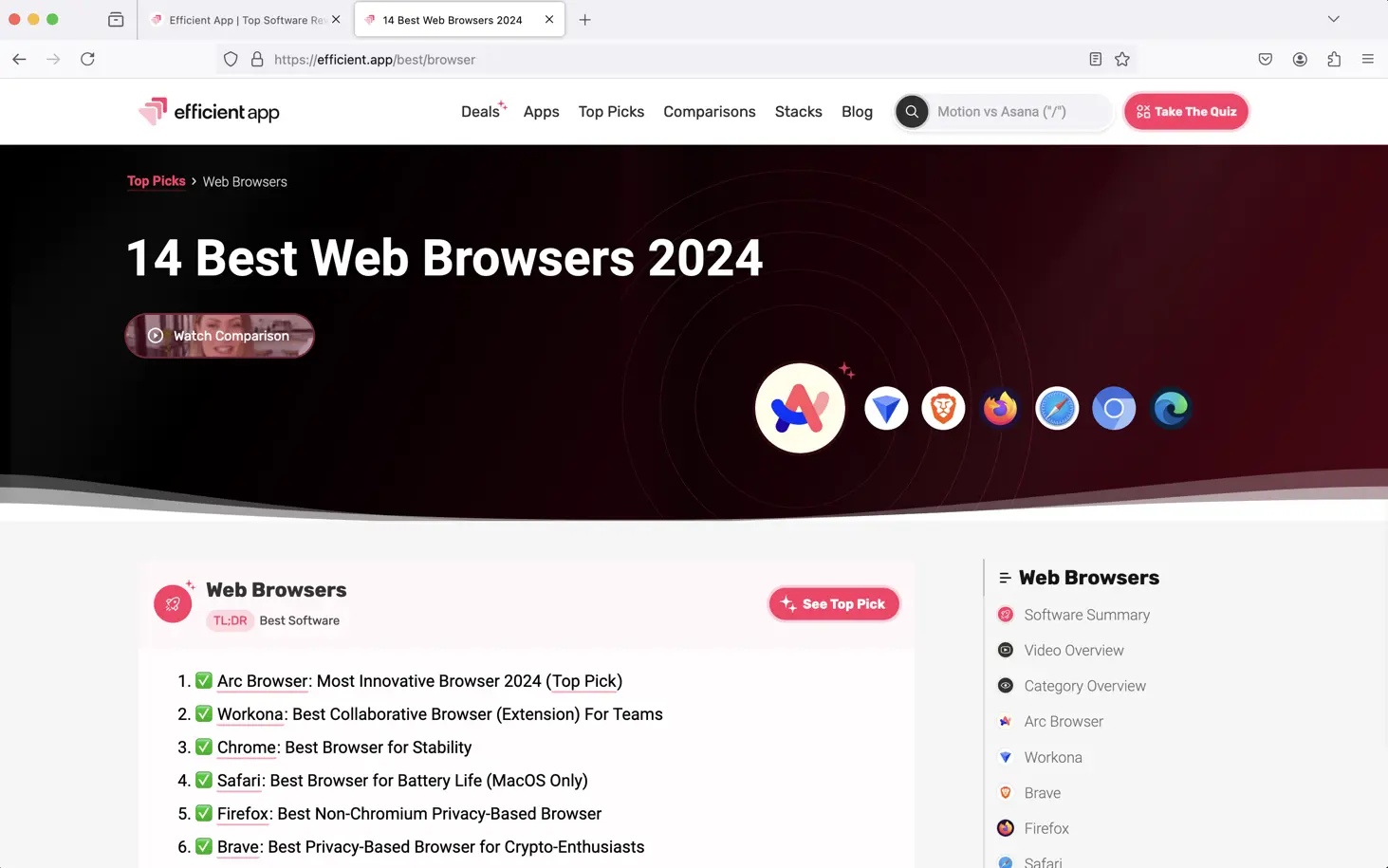
This is one of our top picks in the category so we recommend it over others (you're on the right page), read below to learn why we love and recommend it! ⤵
This is one of the better tools in its category, see below if this tool is right for you! ⤵
Firefox is a non-profit, privacy-focused browser built atop Quantum browser engine instead of Chromium which runs the majority of other browsers on the market.
What this ultimately means is that in exchange for "privacy" you're getting a substantially less supported ecosystem of browser extensions and a higher likelihood of websites not rendering exactly as they were intended due to having less than 3% of global browser marketshare.
Because of that, for most people, we recommend using a Chromium-based browser like that of Arc Browser.
We believe there are better options available in this category, read below to learn what they do well, and what they could do better. ⤵



No shady privacy policies or back doors for advertisers. Just a lightning fast browser that doesn’t sell you out.

Firefox is one of the only privacy-focused browsers that is not built atop Chromium, in theory giving it further distance from the stronghold that Google has in the browser market.
What this ultimately means is all the Chrome extensions that people use and rely on are not compatible with Firefox unless rebuilt specifically for it. Think of it like iOS, Android, and Windows Phone/BlackBerry (which neither exist anymore, but the point is), you'll typically get developers building for iOS first (think of as Chromium/Chrome), Android second (think of as Webkit/Safari), and then Quantum Browser Engine third (Firefox).
Because of that, while you may be choosing a "privacy-focused" browser like Firefox, you're also getting substantially less third-party app support, and a higher chance of websites not performing as intended (like legacy banks or modern sites using newer technology). It simply comes down to there not being enough marketshare for web developers to focus on making everything work properly in Firefox as it only accounts for less than 3% of global marketshare.
Given this foundational difference, it means that the millions of Chrome extensions that are accessible to people, are not in Firefox, unless they rebuild it for Firefox, giving people less options if they choose Firefox as their primary browser.
For that reason, most people who use Firefox also use a second browser as well (typically based on Chromium), like Arc Browser, Chrome, or Brave for when they need full features and functionality like full Chrome Extension support.
That said, while they are a non-profit and privacy focused, they still make the far majority of their money from Google ($500M/yr) by having Google as the default search engine. So if you want to be a sustainable browser, you really need to just make a deal with Google in some way.
Some argue that Google is in some way strategically paying Firefox at this point just to make it seem like Chrome is not a monopoly.

.svg)
.svg)
.svg)
.svg)
.svg)
.svg)

.webp)
.webp)
.webp)
.webp)
.webp)


No, Firefox is one of just a few browser that is not based on Chromium. Firefox is based on Quantum Browser Engine instead of Chromium.
Google pays Firefox $500M+ per year to have Firefox be their default search engine. Some argue that Google is paying Firefox this much solely to make people think that Chrome and Chromium-based browsers are not a monopoly. If Firefox, Safari, and other browsers no longer existed, 99% of browsers would be based on Chromium and essentially controlled by Google.
Yes, Firefox is supported by donations, but they primarily still make the majority of their revenue from Google oddly enough.


.webp)
.webp)
.webp)
.webp)
.webp)


We've tracked and verified the above companies are using this software in their team's stack.


.webp)
.webp)
.webp)
.webp)
.webp)